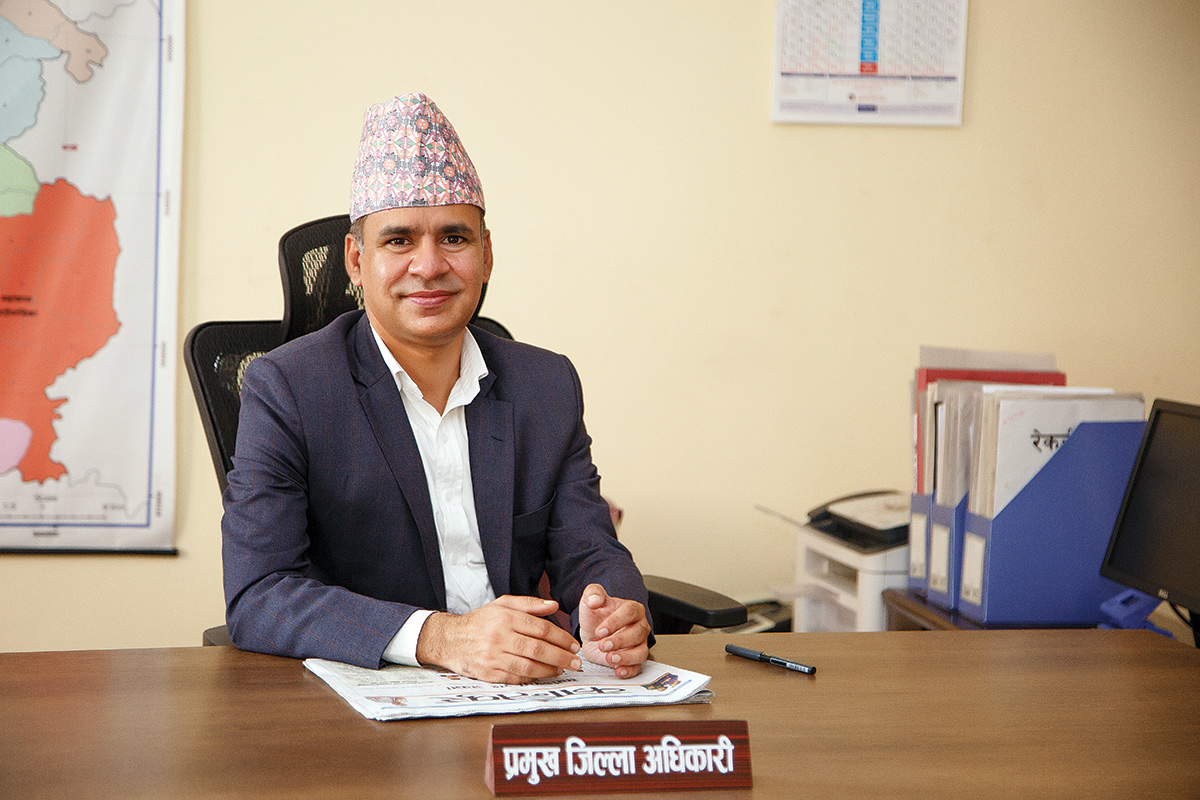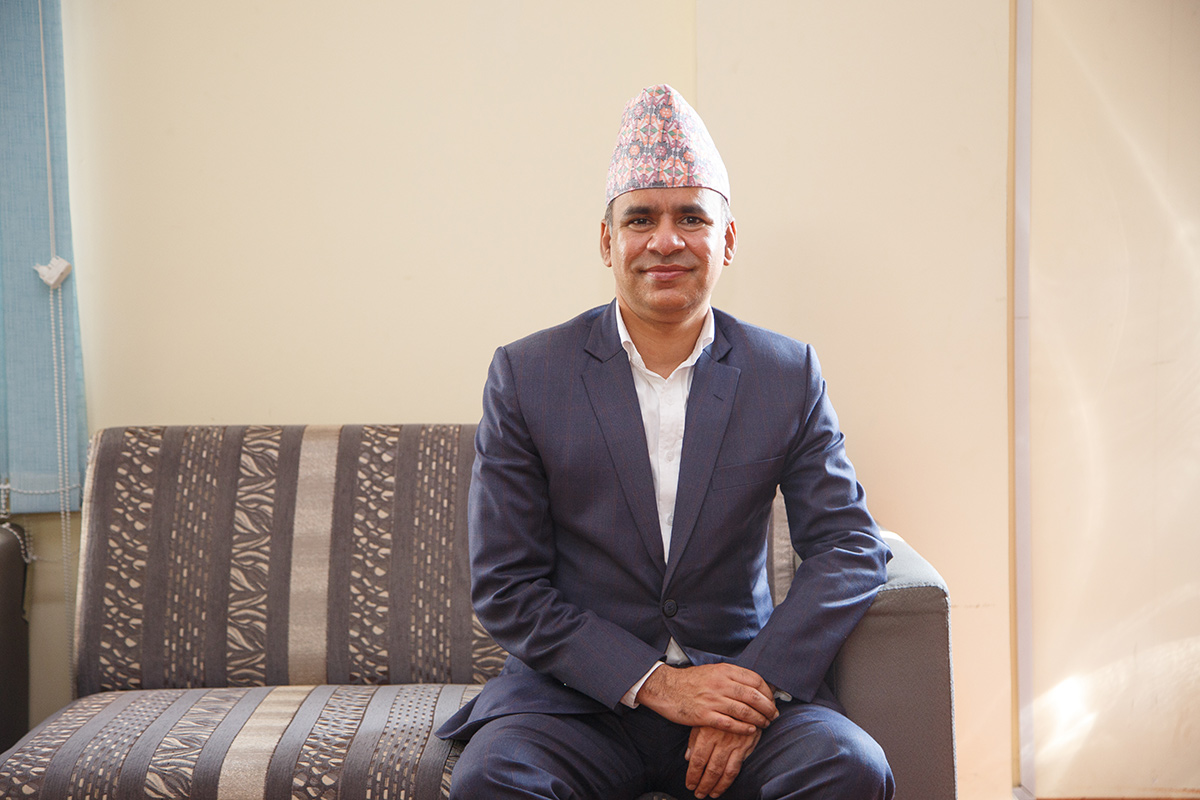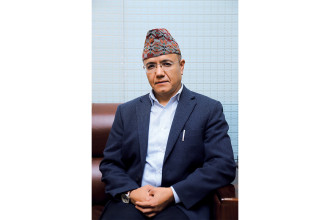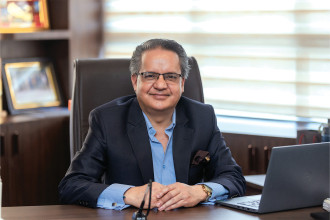
Influenced by his father and other family members who were in government service, Ghanshyam Upadhyaya, Chief District Officer of Lalitpur, always aspired to join the civil service with the desire to contribute to the country in a meaningful manner. His 19-year-long journey in public service started as Section Officer with the Ministry of Finance. Since he has steadily risen up the ranks being promoted to Undersecretary at the National Planning Commission nine years since he first started. Just a year later, he became Joint Secretary through open competition. Of his journey, he says that working as the Joint Secretary at the Prime Minister’s Office and later at the Ministry of Culture, Tourism and Civil Aviation was the most enriching.
Prior to his appointment as Lalitpur CDO a month back, Upadhyaya also served as Finance Secretary of Karnali Province. With a keen interest in travel and studies, he says he derives satisfaction when his work has a positive impact on society.
In this issue of Business 360, Upadhyaya speaks about what leadership means to him and what it entails to be an effective leader.

How would you define leadership?
I believe a leader should be moderate with any person they are working with and be clear about the issue they are dealing with. Unless a person has awareness and clarity about the issue, they will not be able to lead properly. You have to know the intricacies of the field that you are involved in, then only will you be able to show the way to your colleagues and juniors. A leader must also have the capability to make those following you understand and comply with your vision. You cannot have people go astray when you set out to achieve a goal.Is leadership ‘in-born’ or ‘acquired’?
There are various theories regarding this issue. There is one school of belief that says it is an in-born trait while others say leadership qualities are developed along the passage of time. We actually cannot say for certain whether it is this or that. However, I feel leadership is an influence and amalgamation of many experiences. I don’t believe so much in the concept that leadership qualities are in-born. However, the family a person is born into and the upbringing you have do impact you as a person. I personally believe leadership qualities are acquired over time but at the end of the day it all depends on how a person wants to develop himself or herself.Who comes to your mind as an ideal leader?
I will not take any name as such because I am in a public position and it would be inappropriate for me to do so. However, I think an ideal leader is a person who stays away from self-centred interests. It has to be someone who has the ideals of a leader and who follows it to the word. A leader should not be bothered about what they receive in return for the work they do. They should be more concerned about what and how they can contribute to society from the position that they are in.Could you share with us any incident that tested your leadership ability?
When one is involved in government service you come across many difficulties on a day-to-day basis. That is part of our job. And as you rise up the ranks there will be more difficulties as there will be added responsibilities. One example would be when I was posted at the Prime Minister’s Office where I was assigned the responsibility of the earthquake recovery plan. It was a difficult task but I feel I was able to do justice to the faith that was placed in me. The other challenge was upgrading the way we were providing services to an IT-based system. With the world leaping ahead on the technological front, it is inevitable that we need to have office automation systems in place and I initiated the process and completed it. The other challenging time was when I was posted at the Ministry of Culture, Tourism and Civil Aviation and was asked to lead the investigation into the fake rescue scam which was a burning issue at the time. So, there will be challenges along the way. You just have to be prepared to deal with them headlong.How important is it to have a good team to work with?
For any leader to succeed in any sphere of work a team is very vital. Without a team working in harmony, one will not be able to achieve not only the team’s goal but also one’s personal potential. One person cannot do all the work by themselves. Work needs to be delegated. A team also helps boost confidence in any work that one sets out to do. The other aspect is when you have a capable team, the members themselves create an ecology for the work that needs to be done. At times you could come across difficult team members and some may stray from the goals that the team has set for itself. In such situations, the concerned member needs to be given a second chance. A leader should sit down with the person and orient them about the objectives and urge them to work accordingly. However, if they are not willing to mend their ways then they need to be let off from the team. Any member has to either be convinced of what the team has set out to do or be able to convince the team about their ideas.
When should leaders hand over the leadership position?
The leadership position always has to be handed over at an appropriate time to develop new leaders, whichever sector it is. Since I am a bureaucrat I can tell you from the bureaucracy perspective. For instance, in government service, one automatically retires after serving for five years as the secretary. There are some who have retired when they were in their early 50s. That is a system we have in place. Even if that person is doing good they have to retire. That in a way is handing over leadership and preparing the next batch of leaders.What do you consider your most significant accomplishment as a leader?
Over the years, I have been assigned various responsibilities and have been able to accomplish them successfully. But when I look back I feel satisfied with what I have done as Finance Secretary of Karnali Province. I have developed some programmes that will have a long-term positive impact on the economy of the province. One small example would be the upgradation of the airport there. I have prepared long-term budgetary plans for the sustained development of the remote areas of the province. My main focus was on developing the infrastructure of the region. Also, when the Covid 19 pandemic broke out I was in Karnali. Nobody was clear about what would happen next. Many people from Karnali go to India for employment. So when they returned after the outbreak of the pandemic it was a challenge to manage quarantine facilities for them and also to transport them to their respective destinations. I worked as a core member of the team responsible for managing the situation during the pandemic and I must say we were able to do quite a lot, also in terms of setting up isolation centres and facilitating treatment facilities for those infected.How can a leader prepare for the unknown?
The one way that a leader can deal with the unknown is through positivity. If a person has a positive outlook, then no matter what crops up in the future he or she will be able to handle the situation in a proper manner. Moreover, if you do not have any selfish goals and are more concerned about the greater good of society then things will pan out themselves. Any person who has the community and society in their priority will never face any problem as such.As the Chief District Officer what are your plans for Lalitpur?
It has been a little over a month since I was appointed the CDO of Lalitpur and I am taking stock of all the issues related to the district. My first focus is to further improve service delivery. People who visit the District Administration Office for any work must be provided with the best service possible. I also want to make an impact by adhering to good governance practices. The other area I am looking at is developmental works. We are not directly involved in implementing developmental works and our job is to actually just facilitate the process so I will identify the hurdles and help resolve them. I want to be able to contribute at a personal level in these three aspects that I just mentioned. Even long after I am gone from here people should still be able to feel the difference that I make now.What is the best way to keep team members motivated?
There is a lot that goes into motivating people who are working with you. As a leader, one must not always emphasise the work at hand. A leader must be aware of the personal lives of people they are working with. Some may be facing personal problems and if you are able to realise their difficulties and help them get through those problems then they will go out of their way to accomplish the goal. A leader needs to be compassionate. READ ALSO:- Daayitwa organises Economic Governance and Leadership Development training
- We are fundamentally human beings. I never define leadership in gender terms
- Leadership means the same whether the leader is a man or a woman
- I am not demeaning men when I say this; in fact, men in leadership positions, except a few, around the world are doing great
Published Date: November 15, 2021, 12:00 am
Post Comment
E-Magazine
RELATED Leadership





-(1)-1752214965.jpg)